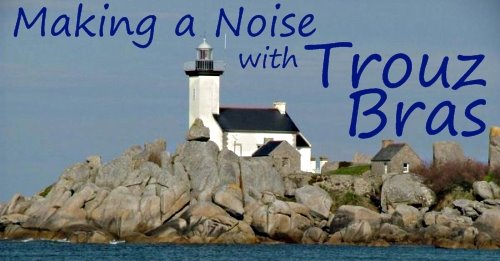All the questions you're dying to ask.
How did you come up with the name Trouz Bras?
"Trouz Bras" translates from Breton (the Celtic language of Brittany) to "big noise" or "great sound." We think it describes us well - we work hard to make a great big noisy sound! Our name is often mis-read, misspelled, and mis-pronounced ("true brazz" FYI). It has nothing to do with fish, or trousers, or brassieres. (BTW, Ray thinks it's all about him and his freaking-loud bagpipes. Pipers are so vain!)
Do you play Cape Breton music?
No. Cape Breton Island is a community in Canada with strong Scottish roots. We play the Breton music of Brittany, the western half of France. It's a country of barren landscapes, Celtic myths and legends, megaliths and unique music and dance.
That sounds cool. What else is Brittany known for?
Crepes. Cider. Bombardes. Awesome cider. A strong sense of community and cultural identity that reaches back thousands of years. Did we mention the awesome cider?
Why do you play Breton music?
Ray fell in love with the music and dance of Brittany when he first visited in the 1920s. Since then he's spent many delirious nights all across Brittany at "Festou Noz" (night festivals), drinking cider and dancing until he keeled over. He loves Breton dancing more than life itself, and he will teach it to anyone who has at least two legs. The locals declared him an "honorary Breton" (a title that was later revoked once they tasted his cooking).
Why is Breton music Celtic?
The Celtic universe is much larger than just Ireland and Scotland. There are actually two distinct families of nations, related by their language and culture. Ireland, Scotland and Isle of Man make up one branch, and Wales, Brittany, and Cornwall the other. Until recently, the ancient traditions of the lesser-known groups have languished in comparative obscurity, but Trouz Bras (and many other newer Breton bands in Europe) aim to help change that. Breton music is traditionally performed on ancient instruments known as the biniou koz (old bagpipe) and bombard (rustic shawm), both of which are extremely loud. As time has progressed, the music has developed with the introduction of fiddles, accordions and guitars. There has been a huge renaissance of interest in the "Fest Noz" in recent years. The music is driving, insistent and mesmerizing and the spiral and circle dances are performed by everyone from the youngest to the very oldest.
Where are you guys in Trouz Bras from?
Ray is originally from Wales, though at some point in his life he has lived in, traveled to, or been kicked out of just about every continent. Mance is a native New Englander. He still lives in the house he was born in. (Still sleeps in the same crib, too). Barry was raised in an Ohio cornfield and grew up playing hillbilly music on a cigar-box fiddle. We're not sure where Brian is from. He just showed up one day with his bass and started playing. We haven't really spoken to him yet. We only know his name because it's written on his butt. With a Sharpie. (Don't ask).
What type of bagpipes is Ray playing?
Ray plays a set of traditional Breton pipes called a "veuze" (which is Breton for "burst eardrums"). He also plays a larger, mellower set of English border pipes. (Of course, it's ridiculous to use the term "mellow" with bagpipes.) The other bag you'll see Ray pick up during performances is filled with gin.
How did you come up with the band's instrumentation?
The bagpipes and fiddle are traditional instruments in Breton music. Barry also plays the vielle, which is a Medieval European fiddle. For the rhythm section we draw on traditional instruments - Mance's bodhrans come from the mists of ancient Irish history, and Brian's electric bass comes from the darkest recesses of eBay. We like using these instruments to back up the tunes, rather than being clichˆ© - no drum set, no guitars, and no keyboards.
But isn't that a guitar Barry's playing?
Yeah, it kind of looks like one, but it's actually a bouzouki.
I thought a bouzouki was some sort of weapon?
In the wrong hands it is.
Do you guys make a lot of money playing Breton music?
It varies. Each member of the band is paid on a per-note basis. So that means Mance gets paid more than the rest of the band. Combined. Ray earns the least, since his droning pipes only clock in at one note per tune.
How is Trouz Bras different from other Celtic bands?
Hmm, well it's likely that we're less tattooed. We rarely play in pubs, and we do all our own stunts.
What? You do our own stunts?
Well, most of them. We use stunt doubles for crowd surfing, and for band rehearsals.
Tuesday, May 29, 2007
Subscribe to:
Post Comments (Atom)

2 comments:
I'd REALLY like to see Ray teach Breton dance to someone with more than 2 legs!
I actually prefer dancers to have two legs, but any number will do really!
One leg is pretty much only good for the Plin.
Post a Comment